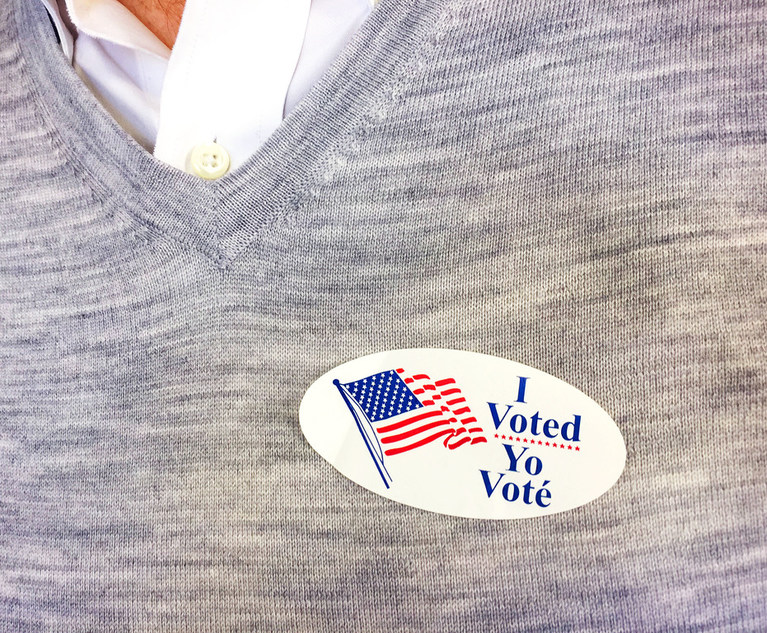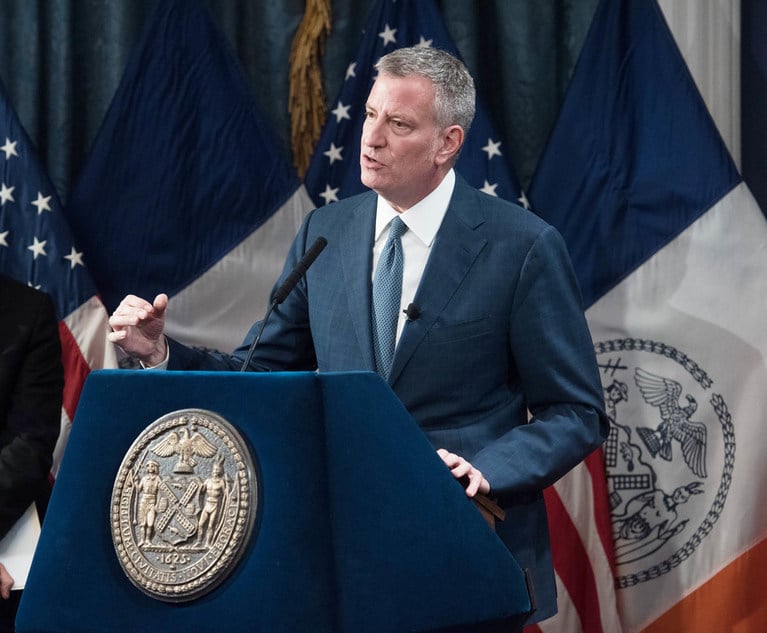 "I Voted" sticker. November 8, 2016.
"I Voted" sticker. November 8, 2016. The Electoral Count Act of 1887: Part 3
The instruction to the President of the Senate to call for objections is what starts the Act down a slippery slope.
May 20, 2022 at 10:05 AM
9 minute read
In Part 2 (NYLJ, April 15, 2022), the first half of the 1887 Electoral Count Act §4 was discussed. The last half reads (phrase numbers inserted to make easier keying comments):
Upon such reading of any such certificate or paper, the President of the Senate shall call for objections, if any. (1) Every objection shall be made in writing, and shall state clearly and concisely, and without argument, the ground thereof, and (2) shall be signed by at least one Senator and one Member of the House of Representatives before the same shall be received. (3) When all objections so made to any vote or paper from a State shall have been received and read, the Senate shall thereupon withdraw, and such objections shall be submitted to the Senate for its decision; and (4) the Speaker of the House of Representatives shall, in like manner, submit such objections to the House of Representatives for its decision; and (5) no electoral vote or votes from any State which shall have been regularly given by electors (6) whose appointment has been lawfully certified to according to section three of this act [The certificate of appointment provision discussed in Part 2 as probably unnecessary and unwise] (7) from which but one return has been received shall be rejected, (8) but the two Houses concurrently may reject the vote or votes when they agree that such vote or votes have not been so regularly given by electors whose appointment has been so certified. (9) If more than one return or paper purporting to be a return from a State shall have been received by the President of the Senate, those votes, and those only, shall be counted which shall have been regularly given by the electors who are shown by the determination mentioned in section two [the "safe harbor" provision discussed in Part 2] of this act to have been appointed, if the determination in said section provided for shall have been made, (10) or by such successors or substitutes, in case of a vacancy in the board of electors so ascertained, as have been appointed to fill such vacancy in the mode provided by the laws of the State; (11) but in case there shall arise the question which of two or more of such State authorities determining what electors have been appointed, as mentioned in section two of this act, is the lawful tribunal of such State, the votes regularly given of those electors, and those only, of such State shall be counted whose title as electors the two Houses, acting separately, shall concurrently decide is supported by the decision of such State so authorized by its laws; and (12) in such case of more than one return or paper purporting to be a return from a State, if there shall have been no such determination of the question in the State aforesaid, then those votes, and those only, shall be counted which the two Houses shall concurrently decide were cast by lawful electors appointed in accordance with the laws of the State, (13) unless the two Houses, acting separately, shall concurrently decide such votes not to be the lawful votes of the legally appointed electors of such State. (14) But if the two Houses shall disagree in respect of the counting of such votes, then, and in that case, the votes of the electors whose appointment shall have been certified by the Executive of the State, under the seal thereof, shall be counted. (15) When the two Houses have voted, they shall immediately again meet, and the presiding officer shall then announce the decision of the questions submitted. (16) No votes or papers from any other State shall be acted upon until the objections previously made to the votes or papers from any State shall have been finally disposed of.
This content has been archived. It is available through our partners, LexisNexis® and Bloomberg Law.
To view this content, please continue to their sites.
Not a Lexis Subscriber?
Subscribe Now
Not a Bloomberg Law Subscriber?
Subscribe Now
NOT FOR REPRINT
© 2025 ALM Global, LLC, All Rights Reserved. Request academic re-use from www.copyright.com. All other uses, submit a request to [email protected]. For more information visit Asset & Logo Licensing.
You Might Like
View All
Ex-NYC Mayor de Blasio Must Pay $475K Fine for NYPD’s Presidential Campaign Security
3 minute read
Read the Document: DOJ Releases Ex-Special Counsel's Report Explaining Trump Prosecutions
3 minute read
Preparing for 2025: Anticipated Policy Changes Affecting U.S. Businesses Under the Trump Administration
Law Firms Mentioned
Trending Stories
Who Got The Work
J. Brugh Lower of Gibbons has entered an appearance for industrial equipment supplier Devco Corporation in a pending trademark infringement lawsuit. The suit, accusing the defendant of selling knock-off Graco products, was filed Dec. 18 in New Jersey District Court by Rivkin Radler on behalf of Graco Inc. and Graco Minnesota. The case, assigned to U.S. District Judge Zahid N. Quraishi, is 3:24-cv-11294, Graco Inc. et al v. Devco Corporation.
Who Got The Work
Rebecca Maller-Stein and Kent A. Yalowitz of Arnold & Porter Kaye Scholer have entered their appearances for Hanaco Venture Capital and its executives, Lior Prosor and David Frankel, in a pending securities lawsuit. The action, filed on Dec. 24 in New York Southern District Court by Zell, Aron & Co. on behalf of Goldeneye Advisors, accuses the defendants of negligently and fraudulently managing the plaintiff's $1 million investment. The case, assigned to U.S. District Judge Vernon S. Broderick, is 1:24-cv-09918, Goldeneye Advisors, LLC v. Hanaco Venture Capital, Ltd. et al.
Who Got The Work
Attorneys from A&O Shearman has stepped in as defense counsel for Toronto-Dominion Bank and other defendants in a pending securities class action. The suit, filed Dec. 11 in New York Southern District Court by Bleichmar Fonti & Auld, accuses the defendants of concealing the bank's 'pervasive' deficiencies in regards to its compliance with the Bank Secrecy Act and the quality of its anti-money laundering controls. The case, assigned to U.S. District Judge Arun Subramanian, is 1:24-cv-09445, Gonzalez v. The Toronto-Dominion Bank et al.
Who Got The Work
Crown Castle International, a Pennsylvania company providing shared communications infrastructure, has turned to Luke D. Wolf of Gordon Rees Scully Mansukhani to fend off a pending breach-of-contract lawsuit. The court action, filed Nov. 25 in Michigan Eastern District Court by Hooper Hathaway PC on behalf of The Town Residences LLC, accuses Crown Castle of failing to transfer approximately $30,000 in utility payments from T-Mobile in breach of a roof-top lease and assignment agreement. The case, assigned to U.S. District Judge Susan K. Declercq, is 2:24-cv-13131, The Town Residences LLC v. T-Mobile US, Inc. et al.
Who Got The Work
Wilfred P. Coronato and Daniel M. Schwartz of McCarter & English have stepped in as defense counsel to Electrolux Home Products Inc. in a pending product liability lawsuit. The court action, filed Nov. 26 in New York Eastern District Court by Poulos Lopiccolo PC and Nagel Rice LLP on behalf of David Stern, alleges that the defendant's refrigerators’ drawers and shelving repeatedly break and fall apart within months after purchase. The case, assigned to U.S. District Judge Joan M. Azrack, is 2:24-cv-08204, Stern v. Electrolux Home Products, Inc.
Featured Firms
Law Offices of Gary Martin Hays & Associates, P.C.
(470) 294-1674
Law Offices of Mark E. Salomone
(857) 444-6468
Smith & Hassler
(713) 739-1250







